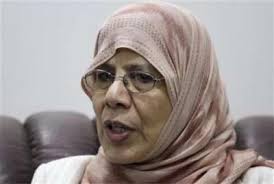
As the controversy on Yemen Guantanamo detainees is showing no sign of abating, Human Rights Minister Hooria Mahsour announced she is flying to Washington this Friday accompanied by her delegation to discuss the situation with American officials.
While Minister Mashour has long been an advocated for lost causes, always attentive to her people's plight for justice, Guantanamo might prove to be a one too complicated file to crack.
Optimistic, the minister told the press on Thursday her ultimated goal was to see all Yemeni prisoners back to their homeland, all 90 of them, starting with the 56 an American court had already cleared for release.
“At the very least, we want the release of the detainees who have been cleared, those who have already been determined to present no threat to the U.S.,” she said. “That, however, is just the first step," said Mashour.
At present Yemen and the U.S, its long standing ally on all things terror are in an impasse, one asking for the rights of its citizens to be respected, the other looking to put its national interest above all else, including one's human rights.
Already dubbed the most controversial issue of the Obama's administration (President of the United States of America) American state officials, including a great many senators have warned that by keeping legally freed men in forced detention the U.S is setting a poor precedent and harming its ethical stance on global issues as it is becoming no more respectful of international conventions and human rights than the very countries it is often critical of: Iran or Sudan to only name a few.
Although President Barack Obama appeared consilient on Wednesday when addressing a press conference, saying he would continue to work toward the closure of the Guantanamo facility, blaming his inaction on the Congress, an official press release by the State Department on Thursday shattered all hopes of a political resolution by confirming a moratorium on sending cleared detainees back to Yemen “remains in place”.
According to President Obama, the congress is preventing him to arrange one prisoner transfer, let alone 56.
President Obama is referring to the National Defense Authorization Act of 2012 (NDAA). This statute confirms the president’s power to wage war against al-Qaeda and its associates, which was initially given to him in the Authorization for Use of Military Force (AUMF) passed shortly after 9/11. The NDAA also authorizes the president to detain enemy combatants, and bans him from transferring Guantanamo detainees to American soil.
But if the American president cannot according to the NDAA transfer prisoners to American soil nothing is actually preventing him from ordering their transfer back to their country of origin.
Section 1028 of the NDAA authorizes him to release prisoners to foreign countries that will accept them.
Now, since Yemen is more than eager to see its nationals return, nothing on paper should prevent detainees from being released; expect maybe that Washington does not feel the government of Yemen can guarantee it will monitor all returnees' activities and report back to the Pentagon as provisioned under the law.
While Washington has been keen to hide behind legal technicalities, rights activists have advanced the American president could very well override the law by declaring an end to America's war against al-Qaeda. If indeed President Obama was to announce an end to the hostilities, which he can do without any special authorization, then all prisoners in Guantanamo, who qualify as war prisoners, would be entitled to immediate release, without further formalities.
In section 1021(a) of the NDAA the Congress affirms the authority of the U.S. armed forces under the AUMF to detain members of al-Qaeda and affiliated groups “pending disposition under the law of war.” Section 1021(c)(1) further provides that “disposition under the law of war” includes “Detention under the law of war without trial until the end of the hostilities authorized by” the AUMF. Thus, when hostilities end, the detainees may be released.
Moreover, the Pentagon has so far been blocking Minister Mashour's requests to visit Guantanamo Bay prison, where she said she wanted "to see with her own eyes just how Yemeni detainees have been living for the past decade or so."
Pentagon spokesman Army Lt. Col. Todd Breasseale said Thursday he was unaware of any current request from Mashour to visit Guantanamo. He added such visits typically are restricted to foreign intelligence and law enforcement officials.
While little is expected now from Mashour's visit, criticism against the White House is gaining momentum. Already the International Committee of the Red Cross and the American Medical Association have sharply denounced the Pentagon force-feeding methods used on hunger-strike detainees, qualifying the move as "a violation of prisoners rights."
The UN also made its opposition known, noting that the indefinite detention of cleared-for-release prisoners was a grave violation of human rights.